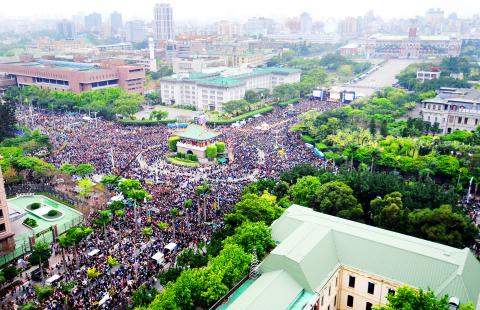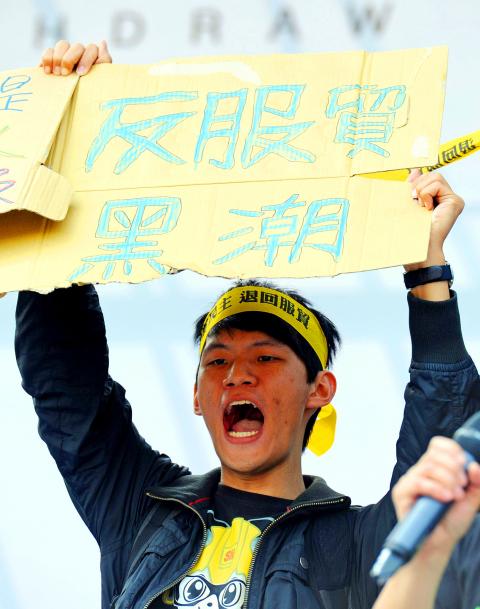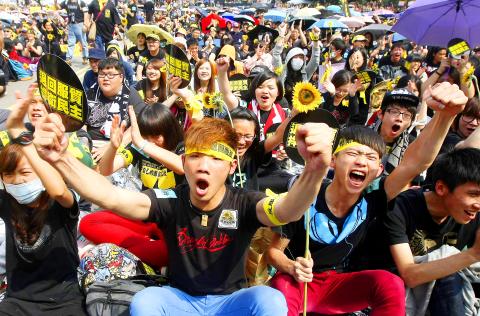Hundreds of thousands of “black-clad army” members took to the streets in Taipei yesterday, wearing black to symbolize what they call the government’s “black-box,” or opaque, handling of the cross-strait service trade pact as they called for the agreement to be retracted and Taiwan’s democracy to be safeguarded.
The demonstrators also wore yellow ribbons that read: “Oppose the service pact, save Taiwan” and chanted slogans such as “Protect our democracy, withdraw the trade deal” as they carried sunflowers, which became a symbol of opposition to the trade deal after the media dubbed the student-led protests the “Sunflower student movement.”
At 2pm yesterday, an hour after the demonstration’s scheduled start time, police estimated that 61,100 people had joined the rally, but “since the police’s number is always an underestimate, we are saying that there are now more than 350,000 people at the scene,” an announcer on the protest’s main stage said.

Photo: Lo Pei-der, Taipei Times
By 4pm, as the number of protesters continued to climb, there was no room left on Ketagalan Boulevard, Chungshan S Road and Qingdao E Road, and latecomers had to join the demonstrators spilling out onto Xinyi Road, Zhongxiao W Road and Liberty Square.
The crowd was such that the National Taiwan University Hospital MRT Station was forced to let trains pass without stopping.
At 5pm, the coalition of student and civic groups behind the demonstration said that approximately 500,000 people had come out to stand for their cause yesterday, while the National Police Agency put the number of demonstrators at 116,000 at the rally’s peak at about 4pm and 101,900 an hour later.

Photo: AFP
Police erected steel barricades to prevent protesters from reaching major government buildings, including the Presidential Office Building and the Ministry of Foreign Affairs.
Yesterday’s rally follows the ongoing student-led sit-in at the Legislative Yuan that began on March 18 and the occupation of the Executive Yuan complex in Taipei on March 23 by other protesters who were forcefully evicted by police the next day.
Before the mass rally began, student protesters issued a press release saying that President Ma Ying-jeou (馬英九) had “continued to deceive the people and fudge the facts” at a press conference on Saturday.

Photo: Toby Chang, Reuters
“With everyone hoping the president would respond positively to the protesters’ appeals, Ma again let us down. The president — despite having an extremely low approving rating — again chose to ignore poll results showing that more than 70 percent of respondents want the pact subjected to a clause-by-clause review ‘in substantial terms,’” the statement said.
The students said the remarks Ma made on Saturday were no different than what Premier Jiang Yi-hua (江宜樺) said a few days earlier, “which was to rewind the situation back to the day before the 30-second ramming through of the pact at the controversial legislative committee meeting on March 17.”
The students were referring to a March 17 committee review session convened by Chinese Nationalist Party (KMT) Legislator Chang Ching-chung (張慶忠) at which Chang announced that the trade deal had passed its review and would go to the legislative floor, drawing furious criticism from opposition lawmakers and helping spark the protests.
Without the institutionalization of a mechanism to oversee cross-strait negotiations and agreements, the 30-second travesty can be repeated, the students’ statement added.
“Ma can still bypass the supervision of the legislature by issuing an executive order. He can still use party discipline and trade favors to force the KMT legislators into submission and pass the pact,” they said. “From the 318 Occupation [of the Legislative Yuan] to the 330 Demonstration [yesterday’s protest], civic consciousness has been rising in Taiwan. More than 50 civic groups are coming out today to form a ‘citizen’s constitutional boulevard,’ with each member to establish a speakers’ corner to discuss issues pertaining to democracy, freedom of speech, healthcare, social welfare, vulnerable groups, labor rights, environment protection or land/residential justice.”
On Ketagalan Boulevard, against the backdrop of a banner reading: “Protect our democracy, withdraw the trade deal,” various student, civic and labor group representatives, as well as lawyers, professors, academics and movie directors, delivered talks on the main stage of the rally from 1pm until the end.
Academia Sinica assistant researcher Peng Jen-Yu (彭仁郁) said she represented about 120 colleagues who have signed a letter voicing their dissent to what they feel is the government’s opaque handling of the pact with China and the violent police crackdown against student protesters at the Executive Yuan on Monday morning.
Also at yesterday’s event was Freddy Lim (林昶佐), the vocalist of Chthonic (閃靈), a black-metal rock band, and Amnesty International Taiwan chairman, who said that state violence against demonstrators cannot be tolerated.
As a musician, Lim pointed to the danger the local entertainment industry faces if the pact is implemented.
“Do you expect artworks and their creators to be free of the Chinese government’s censorship when you invest in performance venues over there [in China]? With investors pouring funds into in both Chinese and Taiwanese performance venues, artists who are censored or refused by Beijing may not perform in Taiwan out of pure economic consideration,” he said.
National Taiwan University professor Yen Chueh-an (顏厥安) told the crowd that “in a democratic country, we do not overthrow a government that we dislike, we change it.”
“However, the challenge we are now facing is a crisis of constitutionalism, which means that we cannot throw disqualified officials out of office or alter the policies that we abhor,” Yen said, before joking that since “it would be too tiring if we have to storm into Legislative Yuan all the time,” Taiwan needs “a long-term solution, which is the citizens’ constitutional conference.”
Academia Sinica research fellow Huang Kuo-chang (黃國昌) said Ma was being intentionally ambiguous in the wording he used at the press conference on Saturday, “misleading the media into believing — contrary to the truth — that he has agreed to three of the students’ four requests.”
He then called on KMT lawmakers to stand with the public rather than the “9 percent president.”
Saying that Ma “keeps hitting a straw man and misguiding the public with questionable information,” student protest leader Chen Wei-ting (陳為廷) asked the president to “face up to the problem.”
Chen added that Ma was insincere in expressing his concerns about Taiwan’s future, since at the same time, he was “obstructing Taiwanese’s concrete participation” in their political system and accused the president of worrying only about his promises to and agreements with Beijing.
“He [Ma] said that renegotiating the pact would hurt [Taiwan’s] credibility, but what he did not say is that there are plenty of examples of such agreements being renegotiated after being reviewed by the signatory countries’ legislative bodies, such as the free-trade agreement between South Korea and the US,” Chen said.
In the closing remarks at the rally, student protest leader Lin Fei-fan (林飛帆) said the public has penned a remarkable page in the nation’s history, “not because we occupied the Legislative Yuan, but because through our actions, Taiwan’s institutions are being widely discussed and scrutinized.”
“We are the ones who should determine Taiwan’s future,” he said. “Taiwanese are the commander-in-chiefs of this country, whose orders the president should listen to and follow.”
Lin reiterated the protesters] demandd of the Ma administration: First, the drafting of “legislation overseeing cross-strait agreements” and then the “review of the cross-strait service trade pact.”
He added that the legislative sit-in will not end because the government fails to answer their demands.
After Lin spoke, the demonstrators chanted slogans such as “President Ma, please listen to the people,” before ending the rally peacefully, with the crowd starting to disperse at about 7:30pm.
Additional reporting by agencies

DAREDEVIL: Honnold said it had always been a dream of his to climb Taipei 101, while a Netflix producer said the skyscraper was ‘a real icon of this country’ US climber Alex Honnold yesterday took on Taiwan’s tallest building, becoming the first person to scale Taipei 101 without a rope, harness or safety net. Hundreds of spectators gathered at the base of the 101-story skyscraper to watch Honnold, 40, embark on his daredevil feat, which was also broadcast live on Netflix. Dressed in a red T-shirt and yellow custom-made climbing shoes, Honnold swiftly moved up the southeast face of the glass and steel building. At one point, he stepped onto a platform midway up to wave down at fans and onlookers who were taking photos. People watching from inside

A Vietnamese migrant worker yesterday won NT$12 million (US$379,627) on a Lunar New Year scratch card in Kaohsiung as part of Taiwan Lottery Co’s (台灣彩券) “NT$12 Million Grand Fortune” (1200萬大吉利) game. The man was the first top-prize winner of the new game launched on Jan. 6 to mark the Lunar New Year. Three Vietnamese migrant workers visited a Taiwan Lottery shop on Xinyue Street in Kaohsiung’s Gangshan District (崗山), a store representative said. The player bought multiple tickets and, after winning nothing, held the final lottery ticket in one hand and rubbed the store’s statue of the Maitreya Buddha’s belly with the other,

‘NATO-PLUS’: ‘Our strategic partners in the Indo-Pacific are facing increasing aggression by the Chinese Communist Party,’ US Representative Rob Wittman said The US House of Representatives on Monday released its version of the Consolidated Appropriations Act, which includes US$1.15 billion to support security cooperation with Taiwan. The omnibus act, covering US$1.2 trillion of spending, allocates US$1 billion for the Taiwan Security Cooperation Initiative, as well as US$150 million for the replacement of defense articles and reimbursement of defense services provided to Taiwan. The fund allocations were based on the US National Defense Authorization Act for fiscal 2026 that was passed by the US Congress last month and authorized up to US$1 billion to the US Defense Security Cooperation Agency in support of the

‘COMMITTED TO DETERRENCE’: Washington would stand by its allies, but it can only help as much as countries help themselves, Raymond Greene said The US is committed to deterrence in the first island chain, but it should not bear the burden alone, as “freedom is not free,” American Institute in Taiwan Director Raymond Greene said in a speech at the Institute for National Defense and Security Research’s “Strengthening Resilience: Defense as the Engine of Development” seminar in Taipei yesterday. In the speech, titled “Investing Together and a Secure and Prosperous Future,” Greene highlighted the contributions of US President Donald Trump’s administration to Taiwan’s defense efforts, including the establishment of supply chains for drones and autonomous systems, offers of security assistance and the expansion of